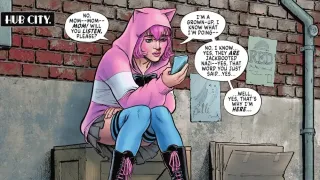May 31, 2024
Review: Queer Sports Drama 'Backspot' Visceral and Empathetic
Megan Kearns READ TIME: 5 MIN.
Women in sports haven't always been taken as seriously as men, and certain athletics are, ludicrously, not considered as serious or challenging as others. Queer sports drama "Backspot" tackles this while featuring a queer Indigenous protagonist.
A fiercely ambitious teen cheerleader struggles to reconcile the challenges of a demanding head coach and the ramifications on her relationship when she and her girlfriend join an elite new team. "Backspot" fuses the feminist insights of iconic cheerleading film "Bring It On" with the intense and disturbing descent into obsession and perfectionism in Lauren Hadaway's excellent queer thriller "The Novice."
Directed by nonbinary filmmaker D.W. Waterson in their feature-length directorial debut, "Backspot" stars Devery Jacobs, a queer Kanien'kehá:ka actress who stars, writes, and directs the series "Reservation Dogs" and has starred in films like "Blood Quantum" and "Rhymes with Young Ghouls." "Backspot" also stars Evan Rachel Wood (who's bisexual) and Kudakwashe Rutendo.
Jacobs and Waterson collaborated on "Backspot," which premiered at the 2023 Toronto International Film Festival, through their production company. In an interview with Entertainment Weekly, Jacobs said that she knew she wouldn't have gotten a role like this if they hadn't created it.
"Backspot" opens with a first-person point-of-view of cheerleading – tumbling, holding people up – amidst a pulsating '90s-esque electronic score. Then, Devery Jacobs faces the camera, breathing hard from her exertion. Jacobs gives a fantastic performance, captivating and full of nuance. A former gymnast, Jacobs did nearly all her own stunts.
Despite the fun rapport and camaraderie of her teammates, Riley puts enormous pressure on herself, blaming herself when others make mistakes or get injured.
Riley and her cheerleader girlfriend Amanda (Kudakwashe Rutendo) cuddle and hold hands after practice. Jacobs and Rutendo have good chemistry. A montage shows a snapshot of their relationship: fun, silly, sweet, and intimate. In a queer teen film, it's refreshing to see both girls' mothers accept and support their relationships and their cheerleading ambitions.
A subtle class commentary exists in the film: Amanda works at a movie theater, and her family can't afford to pay the dues, while Riley's house is much more spacious, and her family can afford the dues.
Head coach Eileen (Evan Rachel Wood) looks to recruit girls from Riley's class to fill spots on the Thunderhawks team. On her audition, Riley falls while tumbling. She defiantly demands a do-over, as she's "better than that." Riley, Amanda, and their teammate Rachel (Noa DiBerto) get accepted, and they immediately train with the team for a competition.
"Backspot" viscerally and empathetically puts you in Riley's frame of mind; you feel what she feels. Close-ups show Riley obsessively picking at her eyebrow, revealing her anxiety. On the new team, Riley's stress increases. Over the course of the film, her eyebrows become sparser, and she has panic attacks. Riley risks punishing her body and sacrificing everything else in her life to succeed.
Amidst tumbling and cheerleading holds, a quick shot reveals Riley vomiting. In the shower, we see Riley's incredibly bruised feet and arms. In a disturbing scene, Eileen pushes a crying Rachel to do a deeper split. She then commands Riley to push Rachel harder with her knee in her back. Amanda uncomfortably watches. The pressure severely strains Riley and Amanda's relationship.
In practice, all the girls look miserable, a stark contrast to the joy and convivial atmosphere in the beginning. Eileen relentlessly pushes them, telling them they aren't special and they all can be replaced. She critiques Riley's expressive face during routines for not smiling.
In a close-up on Riley's face, a slow-motion shot shows a foot (belonging to a cheerleader held up) kick her face, blood immediately running from her nose. Riley worries that she will be cut if her nose swells, as she "won't look good." When the assistant coach reassures her that Eileen likes her, Riley smiles through her bloody nose with a tampon plugging up a nostril, an unnerving visual juxtaposition indicating how much pain Riley will endure for validation and perfection. She desperately yearns for Eileen's approval, partly because Eileen is queer.
Eileen clearly thinks she must be hard and ruthless in order to succeed in competition, instructing Riley not to show "fear, pain, or weakness" because the world is cruel. Numerous films depict emotionally abusive coaches and instructors, like JK Simmons in "Whiplash." Evan Rachel Wood gives a solid steely performance as a queer woman who is under-appreciated in sports. Cracks in her veneer suggest the possibility that this is merely a persona, as she comforts injured girls and helps Riley with breathing exercises during a panic attack. Regardless, her approach is toxic.
The film acknowledges Eileen's perspective, but doesn't condone it, contrasting her demeanor with the nurturing queer assistant coach, Devon (Thomas Antony Olijide, who gives a fantastic performance). He sweetly takes care of Riley when she's drunk underage at a bar and fills in her eyebrows in a tender scene.
"Backspot" keenly addresses the complexities and nuances of cheerleading, treating it with respect as it's a grueling and challenging sport (Riley declares they're "athletes" who "do mind-blowing shit" when a friend's girlfriend says, "Cheer was only invented to keep women out of real sports"), as well as feminist critiques of fat shaming and "infantilizing" costumes that cater to the male gaze.
I thoroughly enjoyed "Backspot" due to its perspective, fantastic stunts, and good performances. I also liked how shots of hand-holding indicate support and solidarity amongst the cheerleaders. However, some stylistic choices didn't quite work for me, and the ending feels a bit too tidy after its intense buildup. Yet, I appreciate how the ending conveys Riley's growth as a character. She learns to accept herself rather than obsessively yearn for approval and external validation, and she learns to not sacrifice who she is and those who matter to her in order to achieve her goals.
"Backspot" opens in theaters and on VOD on Friday, May 31.






